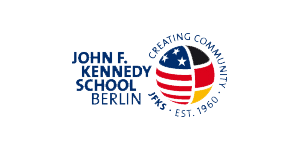The administration of the John F. Kennedy School consists of an American and a German Principal of the Elementary School (ES) and an American and German Principal of the High School (HS). One of these four is also the Managing Director of the John F. Kennedy School.
The principals lead the school as colleagues in accordance with the law and administrative regulations, as well as the instructions and resolutions of the Educational Directorate (E.D.) of the John F. Kennedy School and the decisions of the JFKS School Conference and faculty.
High School:
Managing Director/German Principal: Robert Bartz
American Principal: Erin Hale
Elementary School:
German Principal: Angelika Ecke
American Principal: Dr. Shana Kennedy-Salchow
The assistant principals support and assist the Managing Director and principals in their administrative functions. They develop the schedule, supervision, and substitution plans and are responsible for discipline matters. They arrange for substitute teachers and substitute for the principal of their nationality and level as necessary.
High School:
German Assistant Principal: Gianna Gillert
American Assistant Principal (acting): Derek Getschow
Elementary School:
German Assistant Principal: Klara Senkel
American Assistant Principal (acting): Sam Kleinman
The ED (Erziehungsdirektorium) plays a strategic role in school matters. It is a guarantor of the school’s profile and mission. The ED is a unique committee within the Berlin public school system. Its duties and composition are stipulated in paragraphs 5 and 6 of the JFK School Law (in German).
Whereas the School Conference mostly deals with internal school issues, the central responsibility of the ED is to guarantee the particular binational and bicultural character of the JFKS as a German-American school which incorporates both school systems within its structures.
Members of the Educational Directorate (ED):
This committee is composed of democratically elected representatives from the faculty, student and parent councils, as well as two principals. The SK is mandated by Berlin School Law to serve as a round table for these key school groups – to develop collaborative strategies for old problems or new projects on campus, including strategic planning and practical implementation. The SK meets at school every six to eight weeks.
Members of the School Conference (SK):
The John F. Kennedy Schule Trust Fund e.V. is a non-profit organization founded in 1996 by an agreement between the Berlin Senat and the United States Embassy regarding the John F. Kennedy School. It is listed under VR 17709 B in the Registry of Associations (Vereinsregister) of the Berlin-Charlottenburg court. The Trust Fund supports the American program offered at JFKS by providing students and faculty with appropriate learning materials and support services similarly found in U.S. public schools but not otherwise provided by the Berlin Senate. Its sole income comes annually from U.S. Embassy contributions based on the number of U.S. Embassy students attending the JFKS.
The Trust Fund General Membership consists of – and is limited to – the following nine members and meets annually in the fall:
- The United States of America (Represented by a member of the U.S. Embassy)
- The State of Berlin (Represented by a member of the Berlin Senate Department for Education)
- Three U.S. Embassy Representatives
- Two Principals of the JFKS
- One U.S. and one German legal consultant
The Trust Fund’s Board of Directors consists of the following six general members and meets semiannually in the spring and fall:
- The United States of America (Represented by a member of the U.S. Embassy)
- The State of Berlin (Represented by a member of the Berlin Senate Department for Education)
- Two U.S. Embassy Representatives
- Two Principals of the JFKS
The Trust Fund has fiduciary responsibility for financial resources solely provided by the U.S. Embassy based on the number of U.S. Embassy students attending the JFKS in a given year. The amount of the contribution per student, paid by the U.S. Embassy, is based on comparable Berlin private school tuition expenses. All students enrolled at the JFKS benefit directly and/or indirectly from Trust Fund expenditures.
The Trust Fund expends the contributions, for the most part, throughout the designated school year, with any remaining funds rolling to the next year. All transactions are required to be reviewed and approved by two board members (a Principal and U.S. Embassy Board member).
The Trust Fund Budget is broken down into the following categories:
- Personnel – Both mini-job and part-time positions
- Elementary School materials, equipment, and supplies
- High School materials, equipment, and supplies
- Technology services, software, and equipment
- Extra-Curricular Programs – For example, the Trust Fund supports BERMUN, THIMUN, Odyssey of the Mind, as well as travel for teachers related to these programs and for the Texas Exchange, Ft. Collins Exchange, ISTA, and AMIS music festivals.
- School Publications/Advertisements
- Institutional Memberships- ECIS and NEASC
- Professional Development
- Recruitment of new U.S. teachers/administrators
- Administration – This includes expenses related to bookkeeping, annual audit, bank fees, translations and legal/consulting fees for the Trust Fund.
Per the original agreement, the Trust Fund is prohibited from using its resources for the purpose of capital improvements or facility repairs to the JFKS.
In addition, the John F. Kennedy School also receives funds from the U.S. Department of State’s Office of Overseas Schools (OOS) in Washington, which are deposited into the Trust Fund account. In the past, these funds have provided additional support for U.S. educational materials, professional development, recruitment, and students with special needs; however, the Trust Fund does not have fiduciary or budgetary responsibility for the OOS funds.
The Trust Fund is audited every year by a tax consulting firm located in Berlin. This firm prepares the annual financial statements and submits them to the Finanzamt in order for the Trust Fund to maintain its non-profit status.
